-
About
About our School
At Mount Michael the core of the academic program enables students to become inquiring learners, appreciative of their heritage, responsive and committed to the challenges of the future.
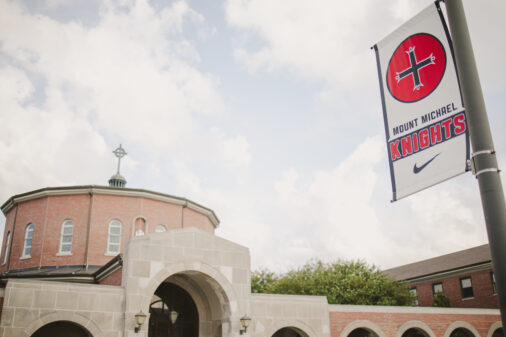
-
Admissions
Admissions
Mount Michael Benedictine School admits students of any race, color, national and ethnic origins to all the rights, privileges, programs and activities generally accorded or made available to the students.

-
Academics
Academics
Ultimately, it is our goal to enable every student to reach his educational and career potential.

-
Counseling
Counseling
The Mount Michael Benedictine School Counseling program is a comprehensive counseling program dedicated to nurturing our students, families, and community.
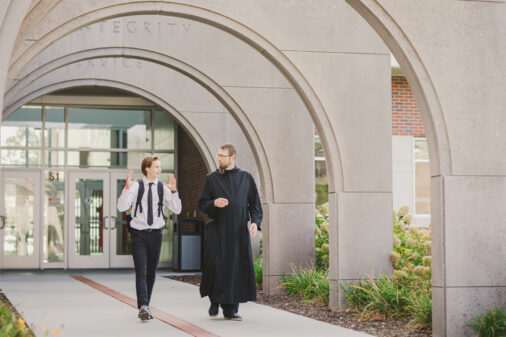
-
Spirituality
Spirituality
Benedictine values encompass a broad range of concepts that are central to life within a Christian community. It is quite possible to literally perceive dozens of values that can be deemed as Benedictine in nature. This a testimony to the breadth of “The Rule” and communal life established by Saint Benedict.
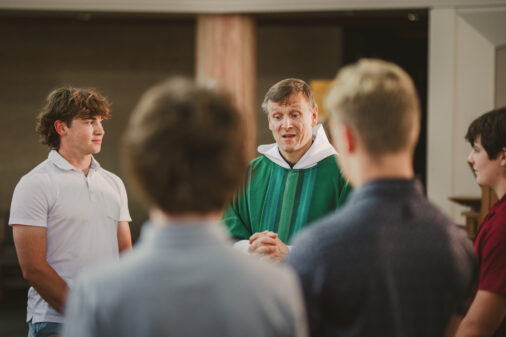
-
Activities
Activities
There are many opportunities for students to get involved at Mount Michael. Some are competitive, some are participatory. In either case it is all part of getting a well rounded educational experience.

-
Athletics
Athletics
There are many opportunities for students at Mount Michael to participate in our top of the line athletic programs. Go Knights!
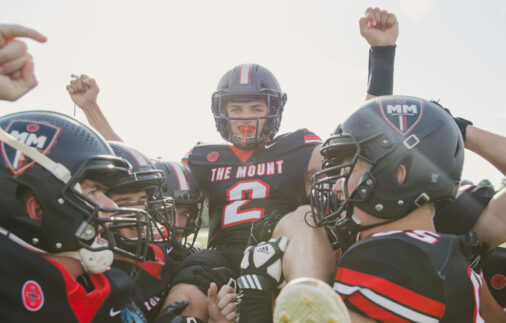
-
Advancement
Advancement
Under this tab you will find links to Mount Michael giving opportunities as well as information about fundraising events.

Language Arts
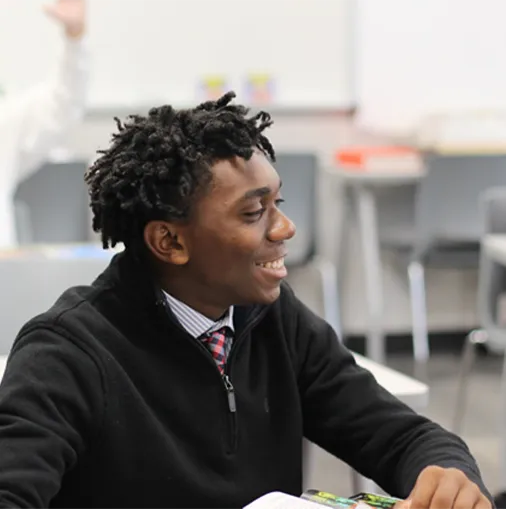
Language Arts
Expand the bars below for a full description of each Language Arts course and the credit hours.
English I
The goal of English I is to introduce freshmen English students to a variety of literary genres. By the end of the school year students should able to define several literary terms and to present examples of these terms from the assigned literature. In addition to developing their literary skills, students will also work on developing an effective and grammatically correct writing style by studying grammar and writing several paragraphs and essays. (2 semesters, 5 credit hours per semester)
English II
Sophomore English is meant to build on the skills mastered in English I, allowing students to develop in their writing and to expand on their understanding of literature and research. Grammar and usage will be studied in the interest of improving students’ writing. Assigned reading will come from the textbook as well as three additional novels. Students will also receive several assignments asking them to analyze books that they read outside of class. The improvement of vocabulary will be targeted through quizzes over words from in-class reading as well as a study of root words. Students will demonstrate their progress through tests, essays, presentations, journal writing, and a research project. (2 semesters, 5 credit hours per semester)
English III
The purpose of English III is to expose students to a variety of United States literature, to help students enhance their writing by completing writing and grammar assignments, and to improve students’ vocabulary through weekly testing. During the first semester students will survey United States literature from its nebulous beginnings up to the 1920s. The purpose of this first semester survey is to examine themes present in our earliest literature that have carried over into our modern literature and culture. It will also help students understand what it means to be “American.” During the second semester students will read novels and plays written by post 1920s United States authors so the students can examine these authors’ views of concepts such as the “American Dream,” individualism, religion, democracy, capitalism, and industrialism. It is expected that students will begin to develop their own opinions about these concepts. Besides studying United States literature, students will also complete a paragraph assignment and two expository essays during the first semester. These writing assignments are designed to enhance the students’ writing style as well as sentence structure and variety. During the second semester, students will complete a 6- to 8-page research paper and one other essay on a topic to be named later. The purpose of completing a research paper is to help students understand the time involved in completing a research paper and to help students learn the proper format, style, and tone of a research paper. In addition to studying literature and writing, students will also prepare for the ACT English test by taking practice ACT English tests and by studying grammar usage rules, punctuation rules, and sentence structure errors. (One practice ACT English test will be averaged into each student’s grammar test grade.) While preparing for the ACT English test, students will hopefully strengthen their knowledge of formal grammar so they may apply it to their writing. Finally, students will have an opportunity to expand their vocabulary through weekly vocabulary tests. (2 semesters, 5 credit hours per semester)
Advanced Placement English Language (AP English) (Junior Year)
Students in AP English Language and Composition will write a variety of essays, prompted by reading a variety of American literature. Since AP English Language emphasizes writing, the course is organized by different types of composition, including personal, persuasive, comparison/contrast, synthesis, cause/effect, analysis and descriptive. Students will keep an observation journal for three of the major novels they will read.
A major argumentative research paper is also included. As a final paper, students will write a process paper entitled “How I write a paper”, with the objective of self analysis and a guide for future writing. As an introduction to the course, students will study the vocabulary and applications of rhetoric. Students will also have periodic AP practice reading and writing tests. (2 semesters, 5 credit hours per semester)
English IV: Dystopian Literature
The focus of the English IV for the 2021 Fall Semester will be reading dystopian novels. Students will read such dystopian novels such as 1984 by George Orwell, Brave New World by Aldous Huxley, Lord of the Flies by William Golding, Animal Farm by George Orwell, Gulliver’s Travels by Jonathan Swift, and The Dream Life of Sukhanov by Olga Grushin. Students will work to improve their class discussion skills and critical thinking skills by leading and participating in class discussions about the novels. Students will also work on their critical thinking skills by writing essays of various lengths about the novels. Furthermore, students will complete an objective exam at the completion of each novel. Finally, there will be random “pop” quizzes to ensure that students are staying current with their reading assignments.
English IV: Individual Versus Society Literature
The focus of the English IV for the 2022 Spring Semester will be novels with individual-versus-society themes. Students will read novels such as Invisible Man by Ralph Ellison, Crime and Punishment by Fyodor Dostoyevsky, Native Son by Richard Wright, One Flew Over the Cuckoo’s Nest by Ken Kesey, and Darkness at Noon by Arthur Koestler. Students will work to improve their class discussion skills and critical thinking skills by leading and participating in class discussions about the novels. Students will also work on their critical thinking skills by writing essays of various lengths about the novels. Furthermore, students will complete an objective exam at the completion of each novel. Finally, there will be random “pop” quizzes to ensure that students are staying current with their reading assignments.
English IV: Horror & The Supernatural
This one-semester course will focus on literature that deals with horror and the supernatural, exploring the topics of good vs. evil, monsters, ghosts, and hell. Students will learn how literature in this genre has developed over the ages, reading classic horror novels such as Dracula by Bram Stoker and Dr. Jekyll and Mr. Hyde by Robert Louis Stevenson, as well as some shorter works from modern horror writers. Class work will include essay writing, reading quizzes, tests, and student-led discussion.
English IV: Nebraska Literature
Nebraska Literature will focus on the discussion of the history, people, and literature related to Nebraska, with special attention being paid to investigating the often-rocky past of the city of Omaha. We will read, analyze, and discuss fiction and nonfiction literature; listen to and discuss podcasts, and watch videos related to the state and people of Nebraska. Some authors we’ll read include the classic Nebraska literary legend Willa Cather, as well as more modern authors from the state like Theodore Wheeler. One topic of interest will be Omaha’s infamous mob boss Tom Denison and his role in Omaha’s seedy history. This class will give students a new perspective on the “boring” and often overlooked state in which they live and learn, as well as open opportunities to see their community not only in literature, but also in a new light overall.
AP English Literature & Composition: Horror & The Supernatural
This full-year course will address the objectives of the AP English Literature and Composition curriculum, with a focus on literature dealing with horror and the supernatural. We will explore the topics of good vs. evil, monsters, ghosts, and hell in selected novels, plays, and poetry from the time of Shakespeare through present day.
AP English Literature & Composition: British Literature
This full-year course will address the objectives of the AP English Literature and Composition curriculum, with a focus on British literature. Selected readings will include novels, plays, and poetry representing periods of British literature from Beowulf to the modern era, including texts that illustrate the development of the English language.
Reading Elective
The primary goal of the Reading Elective is to help each student work toward the elusive goal of being labeled a “well-read person.” Students will do this by reading novels noted for their literary merit. A second goal is to help students improve their class discussion skills and critical thinking skills by leading and participating in class discussions about the novels. Students will also work on their critical thinking skills by writing a one to two-page reflection paper due each week. Furthermore, students will complete an objective exam at the completion of each novel. Finally, there may be random “pop” quizzes to ensure that students are staying current with their reading assignments.
Creative Writing
Creative Writing is an elective English course designed to promote creativity and writing skills. Students will write a variety of creative papers and projects. Writing projects will include: Travel Article, Poetry Book, Television Screenplay, Stage Play, Radio Play, Short Story (sequel), Short Story (original), Creative Projects. This class will meet three times per week.
Writing Elective
Writing Elective is a class designed to help international students with their writing skills. The class will include journal writing, grammar and usage practice, paragraph writing, essay writing, and help with writing from other classes. (2 semesters, 3 credit hours per semester)
Film Studies
This course introduces students to the basics of film analysis, cinematic formal elements, genre, and narrative structure and helps students develop the skills to recognize, analyze, describe, and enjoy film as an art and entertainment form. To understand how films are constructed to make meaning and engage audiences, students will be introduced to the basic “building blocks” and formal elements (narrative, mise-en-scene, cinematography, sound and editing) that make up the film as well as some fundamental principles of analysis, genre, style, performance, and storytelling. The class includes readings, screenings, and short writing assignments. The capstone project requires students to write, direct, and produce their own student film.
Speech
All freshmen at Mount Michael are required to take an introductory speech course. The basics of public speaking — including projection, diction, physical expression, speech structure, and speech writing — are taught. The types of speeches performed in this class include demonstrative, informative, persuasive, dinner speeches, etc. (Two semesters; 2 credit hours per semester)
Advanced Competitive Speech
This two-credit course is designed for students of any grade level who want to further develop their public speaking skills by preparing for and competing in area speech tournaments. The class and practice sessions meet weekly before school, after school, or in the evenings. Students are expected to participate in six or more weekend speech tournaments in late fall and winter, and practice outside of class. Students choose from among 10 areas of competitive speech, focusing either on performance (e.g. duet acting, dramatic, poetry or humorous interpretation) or oratory (e.g. persuasive, informative or extemporaneous speaking). Many students choose more than one event. Oratory events will also help students develop their writing and researching skills. Students, including freshmen, may enroll for as many years as they wish to compete. (2 semesters, 2 credit hours per semester)
Journalism
The journalism courses are offered as electives starting at the sophomore level. The primary focus of these courses is to develop students in the areas of journalistic writing, photography, newspaper design and layout, and yearbook design and layout. The students also have an opportunity to compete against students from other schools in several journalism competitions sponsored by Creighton University and the University of Nebraska – Lincoln.
Journalism I
This is a year-long course offered as an elective for Sophomores and Juniors. It focuses on basic journalistic skills as well as preparing students to participate on the publications team. Skills covered include reporting, writing, editing, layout, photography, graphics, and broadcasting.
BY THE END OF THE COURSE A STUDENT WILL BE ABLE TO:
• Develop and conduct good interviews
• Organize stories in various journalistic styles and mediums
• Distinguish fact/opinion, bias, and slant in news articles and apply in your own writing
• Write a variety of different types of news stories
• Produce journalistic pieces using other medium including photography, audio, and video
• Understand the profound effect technology has had on modern journalism
(2 semesters, 3 credit hours per semester)
Journalism II/III
This is a year-long course offered as an elective for Juniors and Seniors
This course continues the development of journalistic skills through the publication of the school newspaper, The Mount, its online companion, The Freelance and the school yearbook, The Seeker. Students will actively participate in the decision-making process and production of all publications
AFTER SUCCESSFULLY COMPLETING THIS COURSE, A STUDENT SHOULD BE ABLE TO:
• Produce stories in all mediums that are interesting to our reader base.
• Take photographs, are interesting, technically solid, and properly formatted.
• Layout newspaper and/or yearbook, building strong skills in Adobe In-Design/Photoshop
• Meet deadlines
• Make sound decisions, work as a team, lead well, communicate with others to accomplish a common goal—publishing the best newspaper and yearbook possible
• Compete well in journalism competitions.
(2 semesters, 5 credit hours per semester)
Prerequisite: Journalism I

